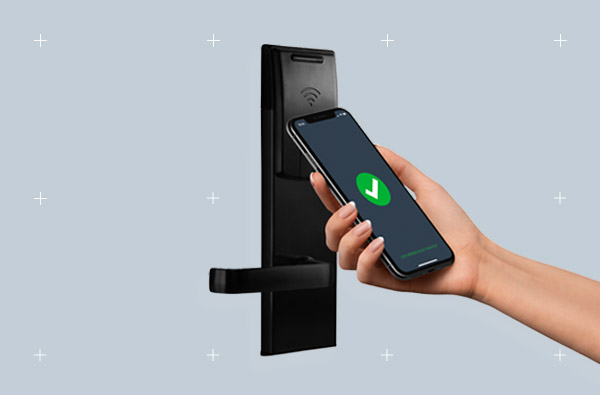Table of contents
Back in the heady days of November 2017, we wrote a blog post about hotel door locks. It’s really good — you should check it out before reading this one. In fact, it’s the most popular blog post we’ve ever written. So given that you’re all so interested in door locks, we thought we’d take another look at how things have progressed in the last couple of years.
Last time, we said that "we are only now starting to glimpse the potential for electronic lock technology". So what's changed since then? Did we witness a golden age of digital unlocking? Nope. All that’s really changed is that your door locks are two years older.
No one is downloading your app
We hate to say it, but if you’re an individual hotel or part of a small group, guests don’t want to download your app. Even the biggest chains are met with resistance. In the 2019 State of Texting Report by Zipwhip, they found that 61% of consumers would not install a new app on their smartphone.
Mews client welcome hotels Switzerland are using an app-based digital key, in addition to their key cards. They’ve seen little take up with customers so far, largely because of the need for guests to download an app. But the app problem isn’t always just unwillingness on the customer’s part: properties themselves can be reluctant or restricted when it comes to distributing mobile keys. Diana Roy, Revenue & Distribution Manager at welcome hotels Switzerland, says:
“Unfortunately not many of our guests are using the app. Also, we only send the mobile keys to guests who checked in online, so that we can be sure we have all the data we need before they arrive. Most of the users are returning guests.”
Unless your customers have loyalty to you as a brand — specifically, if they’re repeat guests — they won’t download your app."
It makes complete sense that you wouldn’t give a guest a key until you’ve taken all the information you need. To achieve a seamless, fully digital guest experience, you rely on the guest to fulfill their part of the bargain and check in online before they arrive. That’s already a potential problem, after which you then have to persuade them to download an app they may use only once.
The fact is that unless your customers have loyalty to you as a brand — specifically, if they’re repeat guests — they won’t download your app. That’s why only industry giants Marriott and Hilton have been able to boast about their mobile key success. In hostels, by the way, mobile app adoption is even lower. Hostels who have launched their own branded app usually get below 10% take up.
Does Mews generate mobile keys?
If you’ve just invested in bluetooth door locks and you’re looking for a workable solution, you’re in luck. As part of our ever-expanding integration marketplace, Mews is now capable of sending commands to Hotek and Salto JustIN so that your bluetooth keys can be enabled for guests. Just don’t get upset when they don’t use them. Diana Roy, again:
“Depending on the hotel, we get between 2% to 16% of guests using the Mews online check-in. We can’t track how many of these guests are using the app because we don’t get the information as to whether they installed it — but it will be a small amount.”
Mews is now capable of sending commands to Onity, Salto JustIN and Messerschmitt — plus we're working on the integration for the new Hotek mobile key."
Clearly, there’s still some way to go. On the positive side, these mobile keys do offer guests the opportunity to try something different, but the fact that so few are making this choice tells the real story.
What's the solution?
You can make operational decisions that funnel guests in the direction of mobile keys. Reducing reception opening times can force more guests to check-in online and download your app. But people don’t want to feel cajoled into doing something: they want to get there by their own choice. What we need, then, is more technological change.
The industry needs to start thinking about the solution to guest access in the same way that airlines think about boarding passes: every customer should be able to use a solution that works best for them. That could be an Apple Wallet pass, a simple email download, a code sent via text...
In fact, we’ve deployed Apple Wallet to all of our hotels already. This means that guests are already equipped with QR codes that could be used as a digital key — all we need is for a lock company to come in and bridge the gap so guests can use them. The bottom line is that using a mobile key should be seamless: a guest arrives at your property and, using their phone, can go straight to their room if they choose to.
We’ve deployed Apple Wallet to all of our hotels already. This means that guests are already equipped with QR codes that could be used as a digital key."
The technology also needs more basic, iterative advances. Verification failures and signal problems, for example, are still typical in some solutions. But these kinds of improvements will happen naturally as the adoption of phone keys increases and companies are required to meet the increasingly high expectations of travellers.
An honourable mention goes to GOKi (formally Tipi) who are enjoying success in the hostel market with their digital SmartLock solution. Unlike many other platforms we’ve seen, GOKi is modern, user friendly, and offers features beyond door lock technology, including guest behaviour analytics and an accessible online community with easy messaging and up-sell / cross-sell booking features. Combine this with access to a wide network of properties, and it goes some way to explaining the remarkable 69% download rate for GOKi’s app. It might not be the best solution for every property, but it’s definitely at the head of the pack — and, of course, it integrates with Mews.
What does the future hold?
It doesn’t take a crystal ball to tell you that in the world of hotel door locks, change will continue to be slow. It is happening, and things will continue to improve, but we’ve yet to see that real game-changer. And until costs come down, budget will remain a legitimate blocker for many properties. It can cost as much as €500 per door to replace existing locks with mobile-enabled locks, and for most hotels and hostels there are higher priorities when it comes to investment.
As a response to these prohibitive costs and the lack of airtight solutions, in 2019 we introduced the Mews Operator, which allows guests to cut their own keys when they arrive at the property. This really helped those hotels who didn’t have the budget to go digital with their door locks, as it still allowed a seamless check-in experience for those guests who checked in online.
No one is providing a solution strong enough to convince hoteliers and guests to adopt digital door lock technology en mass."
But what about a truly digital keyless solution? There are a couple of options out there, such as 4SUITES, which is a 100% cloud-based option with cloud-connected locks and mobile keys. Their option works with a web app, meaning you don't need to install anything directly to your phone. However, the simple truth is that most hoteliers and guests still need to be convinced to adopt digital door lock technology en mass. And, according to Diana Roy, it all comes back to that initial app problem:
“The fact that someone needs to download an app is a showstopper — and will always be a showstopper. We’d love to get a better solution where the guest can open the door with their phone, but without an additional app. The time for an open industry standard is now.”
If someone can figure out a secure, scalable way of doing this, it could be the key that unlocks the future of hotel door locks. So who’s going to step up? You know what they say: if you want something done properly, you have to do it yourself…

Author
Tom Brown
When Tom isn't creating outstanding marketing content for Mews as Principal Copywriter, he writes fiction for himself. Either way, he only uses the best words.

Essential hotel technology for general managers
Download now
Hospitality hot takes straight to your inbox


.webp)